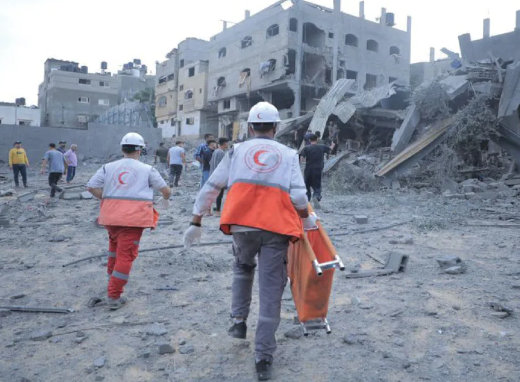The Disasters Emergency Committee (DEC) is closely monitoring “the rapidly deteriorating humanitarian situation” following the escalation of violence in Israel and Gaza.
The aid charities organisation is now assessing it “against our criteria for launching a DEC fundraising appeal, including access for delivering aid”.
It said it is “deeply concerned for the safety and well-being of civilians caught up in the deadly intensification of violence”
Already ten of its member charities have launched appeals to help those impacted by the violence.
This includes appeals from Christian Aid, Oxfam, Islamic Relief, Save the Children and British Red Cross.
Islamic Relief warned last night that hospitals in the Gaza strip “are set to run out of power and go dark, possibly within days” as fuel runs out.
“The consequences of these hospitals losing power are beyond anything a person with an ounce of humanity wants to imagine. The medical staff there are already doing heroic work remaining in these hospitals despite Israeli military orders demanding that they evacuate,” an Islamic Relief spokesperson said.
“It’s a step in the right direction that Israel is allowing a small number of aid trucks to enter Gaza. The UN says a regular, unimpeded, continuous flow of 100 or more trucks a day is needed to meet the immense humanitarian needs on the ground.
"It is so cruel to starve Gaza of the fuel it needs to produce safe drinking water and treat mounting numbers of injured people.”
Criteria for launching a UK wide appeal includes whether the disaster needs swift humanitarian assistance, the coalition’s member charities can provide support and that a public appeal would be successful.
Current appeals to support disaster hit regions include DEC’s Turkey and Syria Earthquake campaign and appeals to support those impacted by floods in Pakistan and war in Ukraine.
Meanwhile, the Foreign, Commonwealth and Development Office is recommending people wanting to give make donations to people in Israel and Gaza through “established and well-coordinated emergency response appeal mechanisms” via the British Red Cross and UN Relief and Works Agency for Palestine.
It says that those wanting to donate to other good causes supporting victims of the violence in Gaza and Israel to first check the charity register to ensure they are legitimate.
The government also wants people to donate cash rather than goods, as “currently, getting aid into Gaza is complex” and relies on a single border crossing with Egypt.
“We cannot provide advice to you or your organisation on shipments (for example, transport, logistics, tax, customs),” added the government’s advice.
Earlier this week a group of UK refugee charities called on the UK government to bring in a support scheme for those wanting to flee conflict in the region. They want this to be modelled on the recent scheme to support those fleeing Ukraine following Russia’s invasion.
Latest News
-
King’s New Year’s Honours list pays tribute to charity leaders
-
Charity Leaders’ 2026 To Do List
-
Toy library charity to fight on despite closure fears
-
2025: A year in the news
-
Funder launches initiative to improve charity board diversity
-
National Trust's former legal counsel takes senior role at charity regulator
Charity Times video Q&A: In conversation with Hilda Hayo, CEO of Dementia UK
Charity Times editor, Lauren Weymouth, is joined by Dementia UK CEO, Hilda Hayo to discuss why the charity receives such high workplace satisfaction results, what a positive working culture looks like and the importance of lived experience among staff. The pair talk about challenges facing the charity, the impact felt by the pandemic and how it's striving to overcome obstacles and continue to be a highly impactful organisation for anybody affected by dementia.
Charity Times Awards 2023
Mitigating risk and reducing claims

The cost-of-living crisis is impacting charities in a number of ways, including the risks they take. Endsleigh Insurance’s* senior risk management consultant Scott Crichton joins Charity Times to discuss the ramifications of prioritising certain types of risk over others, the financial implications risk can have if not managed properly, and tips for charities to help manage those risks.
* Coming soon… Howden, the new name for Endsleigh.
* Coming soon… Howden, the new name for Endsleigh.
Better Society

© 2021 Perspective Publishing Privacy & Cookies











Recent Stories